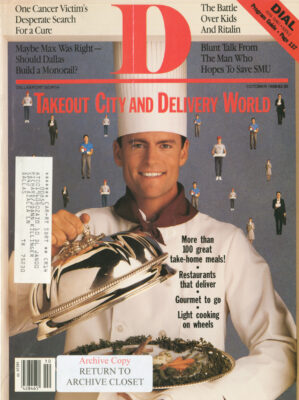Afable for our times:
Once upon a time there was a healthy, well-loved, well-bred dog named Dallas. Dallas had a great big bushy tail, spotty in places perhaps, but otherwise one of the canine’s best assets. Since Dallas was a vigorous and active animal, he wagged his tail often.
Then one day Dallas noticed that his tail seemed to be developing a will of its own. Dallas had become ridden with fleas and ticks and other bothersome afflictions common to his breed, and his tail, in an effort to avoid those infestations, wanted less and less to do with him. Worse, the tail seemed at times to wag him.
As he became less and less able to control his tail, Dallas began to lose confidence. Other dogs in the neighborhood, not to mention those important humans who fed him, began to view the once-spunky canine in a different light. With his limp tail refusing to wag, Dallas didn’t seem so attractive anymore.
Then one day a terrible thing happened. Without a vigorously wagging tail to prove to the world that he was strong and happy, Dallas just gave up, laid down, and died. Of course his tail, once the pride of a strong animal, died too.
THIS ALLEGORY. TO THOSE ACTIVE IN CIVIC DIALOGUE, WILL be comprehensible. For the uninitiated, let me interpret.
Dallas is an unusual star in the galaxy of large urban cities because it is surrounded by growing and increasingly powerful suburbs. Some of those communities-and there are more than seventy of them-are in Dallas County; others, like Piano, are not. Over the past decade, the suburbs have, in varying degrees, grown stronger, more self-determined, and in some cases detached from the problems that continue to plague Dallas: crime, education, race relations, faltering leadership, transportation. The suburbs (the tail) have been strengthened by recent gains-Plano got Pen-ney’s, Addison got the Grand Prix. Each victory leaves them a little less dependent on Dallas (the dog).
Nowhere has the struggle between city and suburbs been more evident than the DART board. DART found out the hard way what happens when a regional commission lacks a shared agenda. Now a new committee will attempt to impose order on what is an increasingly disorderly beast (see page 73).
No matter what happens with DART, the commotion has generated talk about a formalized system of power-sharing, commonly referred to as metro government. The concept of metro government is in varying stages of evolution in a number of places, including Metropolitan Dade County, Florida; Indianapolis; and Toronto. In our area, it has been alive and well for some years in the D/FW Airport Board.
There are as many definitions of metro government, I discovered, as there are people talking about it. Some define it as any form of voluntary cooperative effort that reaches across the region. Others see it as something more-a consolidation of services, like fire protection or trash collection or libraries, with governance authority granted by legislation.
In Minneapolis-St. Paul, a “Metropolitan Council” made up of eleven appointed members oversees a wide range of policy and planning issues that affect the entire region. The group has no operating authority, but it does monitor the capital budgets of the various agencies it controls. The group developed a unique tax-sharing program whereby both Minneapolis and St. Paul are enriched by the property taxes of the commercial residents of either. The whole idea, according to The University of Texas at Dallas Dean of Social Sciences Royce Hanson, is to keep the “Screw Your Neighbor” mentality at bay.
Few objective observers would deny that there are things the Dallas/Fort Worth area could be doing better if we took a regional approach. But most believe that politically, metro government doesn’t have a prayer.
Why? Because too many people have too much to lose. Newer political forces in Dallas-for instance, minorities and neighborhood groups-would see any move away from municipal government as a dissolution of their political base. And anywhere that a fiefdom exists-meaning everywhere else-they probably wouldn’t cotton to the idea either.
Despite the lip service being paid to the idea, a lot of “Establishment Dallas” doesn’t think much of it. A case in point is a recently completed study by the Dallas Citizens Council, which sought to identify duplication among area economic development efforts. The attempt was noble, and the study reportedly contains valuable information, but we can’t say for sure because it was buried about thirty seconds after it was leaked to the newspapers. What caused a stir was the suggestion that the Dallas Partnership (an arm of the Greater Dallas Chamber of Commerce) play the role of lead horse in seeking to attract development to the Dallas area. The outcry was immediate: how can any group with the name “Dallas” in it represent Irving or Piano or Fanners Branch?
That’s the sort of mistake that makes Dallas seem parochial in its vision. Regionalizing, says County Judge Lee Jackson, “requires aggressive compromising.”
Still, there are efforts under way to test the concept. Most of them are emerging from a Dallas group, the Mayor’s Commission On International Development, headed by businessman Mort Meyerson. The commission had no intention of studying ways to improve problem-solving through a regional approach. Actually, it set out to kick Dallas in the rear and get it in shape for the big-time playing field of the Nineties and beyond, But interestingly, most of the commission’s recommendations are decidedly “metro” in scope. The report talks about regional synergy in attracting research entities to North Texas. About sharing cultural and arts resources. About pooling ideas on educational curricula and medical advancements. Written between every line is a warning: the “Dallas-first” mentality won’t fly in the 21st century.
But suffice it to say that neither will the attitude in some suburbs that Dallas should wither under its own incompetence. As Meyer-son puts it, “United we stand, divided we die.”
Related Articles

Home & Garden
The One Thing Bryan Yates Would Save in a Fire
We asked Bryan Yates of Yates Desygn: Aside from people and pictures, what’s the one thing you’d save in a fire?
By Jessica Otte

Business
New York Data Center Developer Edged Energy to Open Latest Facility in Irving
Plus: o9 Solutions expands collaboration with Microsoft and Dallas-based Korean fried chicken chain Bonchon to open 20 new locations.
By Celie Price

Restaurants & Bars
Where to Find the Best Italian Food in Dallas
From the Tuscan countryside to New York-inspired red sauce joints, we recommend the best of every variety of Italian food available in North Texas.


